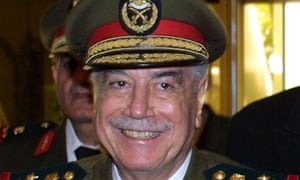
He called the Palestinian leader Yasser Arafat “the son of 60,000 whores”, charged Jordan with “Judaising” its citizens, accused Turkey of collaborating with “the enemies of the Arabs” and blamed the Israeli intelligence agency Mossad for the 9/11 attacks on the US. Diplomacy was not, perhaps, the strongest suit of Mustafa Tlass, the Syrian defence minister from 1972 until 2004, who has died aged 85.
He professed his love for Madonna, Jennifer Lopez and Gina Lollobrigida, in 1983 he marvelled at how a Beirut bomber had “succeeded in sending 200 American Marines to hell”, and he openly demanded that Syria should absorb Lebanon.
Loose cannon though he was, Tlass was nevertheless for many years a pillar of the Ba’ath party establishment, and his influential economic networks spanned Syria, Lebanon and Iraq. He was unerringly loyal to Hafez al-Assad, the Syrian president for three decades, and after Assad’s death in 2000 helped secure power for his son, Bashar. Tlass had been due to retire in 2002, but the grateful Bashar responded by reappointing him defence minister, despite US protests.
Tlass was born in the western Syrian city of Rastan. His father, Abdul-Khader Tlass, had grown rich selling guns to Turkish garrisons during Ottoman times. Mustafa went to school in nearby Homs, and at 15 joined the banned anti-imperialist Ba’ath party. Four years later he became a Ba’ath cell leader in Rastan. After studying law and briefly teaching sports, in 1952 he enrolled at the Homs military academy, where he met Hafez al-Assad, an air force cadet.
When the Ba’athists wrested power in Syria in 1963, Tlass immediately joined their military committee. Syria’s defeat by Israel in the six-day war of 1967 prompted major recriminations; and amid the turmoil he rose to be chief of staff and a major-general. After Assad seized power in a coup in 1970, he named Tlass defence minister and deputy commander of the armed forces. Tlass showed his loyalty by warning: “Whoever says ‘no’ to the president will be shorter by a head.”In 1954 Tlass became a tank commander and four years later he and Assad were posted to Cairo when Egypt and Syria fused to form the United Arab Republic. The union dissolved in 1961, and Egypt jailed Syrian officers, including Assad. Tlass escaped by sea, escorting Assad’s wife and baby daughter, only to be incarcerated as a subversive on his return home.
He was pivotal in planning the joint Syrian-Egyptian pincer strike on Israel in October 1973, timed for Yom Kippur, the holiest day in the Jewish calendar. Israeli forces reeled as Syrian troops and 1,400 tanks fought to regain the Golan Heights, and even though they rebuffed the attack and advanced on Damascus, the war restored Syrian honour. A year later, Syria recovered Golan’s capital, Quneitra, through negotiation.
His Soviet links were another source of Tlass’s strength. In 1972 he completed a general staff course at the Voroshilov military academy in Moscow. As Syria’s chief envoy to Russia, he persuaded Russia to rearm the Syrian army and air force after the October war. But when Soviet power appeared to be waning in the 1980s, Tlass began siding with Washington, even to the extent of committing Syrian troops to the US-led coalition in the 1991 Gulf war.
Syria’s enforced withdrawal from Lebanon in April 2005 accelerated Tlass’s demise. He retired from the Ba’ath command at the party congress that June and liberals welcomed what seemed like a long-delayed changing of the guard. Yet the expected reforms failed to materialise, which led to an uprising in 2011 that Bashar al-Assad immediately tried to quash. Tlass’s birthplace of Rastan was an early centre of revolt.His influence diminished as scandal engulfed his family, and Tlass resigned as defence minister in 2004. His elder son, Firas, was investigated for involvement in the smuggling of arms, drugs and oil, and his daughter Nahed, widow of the arms dealer Akram Ojjeh, was caught up in financial shenanigans in France.
With war raging, Tlass left for France, ostensibly for medical treatment. Firas had already angered Assad by demanding that the Ba’ath party surrender its monopoly on power, and he fled to Egypt. In 2012, Tlass’s second son, Manaf, a leading general, also deserted the regime, joined his father in Paris and openly backed the revolution.
Tlass is survived by his wife, Lamia (nee al-Jabiri), whom he married in 1958, and their two daughters, Nahed and Sarya, and two sons, Firas and Manaf.
• Mustafa Tlass, politician and soldier, born 11 May 1932; died 27 June 2017


No comments:
Post a Comment